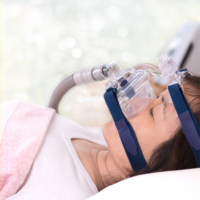There are no products in your shopping cart yet.
Sleep apnea and snoring in women

Types of Sleep Apnea in Women
Obstructive Sleep Apnea (OSA)
This is the most common form of sleep apnea, caused by temporary blockages or obstructions of the airway during sleep. These obstructions can result from the relaxation of throat muscles and tissues, causing the airway to narrow or close.
Central Sleep Apnea
This form of sleep apnea is caused by a dysfunction in the brain's respiratory regulation system. It occurs when the brain does not effectively control the muscles responsible for breathing during sleep.
Mixed Sleep Apnea
This is a combination of obstructive and central sleep apnea, where both physical obstructions and issues with respiratory regulation play a role.
Causes of Sleep Apnea in Women
Several causes of sleep apnea in women include overweight and obesity. Excess fatty tissue around the throat can block the airway. Other causes may include a thick neck, older age, smoking, alcohol and sedative use, genetic predisposition, and hormonal fluctuations. In this blog, we will focus on the hormonal changes.
Sleep Apnea in Women Due to Hormonal Fluctuations
Hormonal changes throughout a woman's life can affect muscle tone and airway, which in turn is relevant for sleep apnea. Let's delve deeper into the different life stages of women and how hormonal changes are related.
Menstrual Cycle
The menstrual cycle of women comes with significant hormonal fluctuations. During certain phases of the cycle, estrogen and progesterone can vary, which may affect muscle tone and airway. Some women notice an increase in sleep-related breathing problems, such as snoring and sleep apnea, during their menstrual cycle.
Pregnancy
Pregnancy is another life stage where hormones change significantly. Hormonal fluctuations, weight gain, and changes in the anatomy of the airway during pregnancy can contribute to an increased risk of sleep apnea. Many pregnant women notice that they snore more or show symptoms of sleep apnea.
Menopause
Menopause is a life stage where levels of estrogen and progesterone dramatically decrease. These hormonal changes can lead to changes in body composition, such as weight gain and a decrease in muscle mass, which may increase the risk of sleep apnea.
Polycystic Ovary Syndrome (PCOS)
PCOS is a hormonal disorder that occurs in women and can be associated with insulin resistance, weight gain, and hormonal imbalances. Women with PCOS may be at an increased risk of sleep apnea due to these factors.
Sleep Apnea in Women
Hormonal fluctuations can affect the airway and contribute to the onset or worsening of sleep apnea. In turn, sleep apnea can cause hormonal changes, such as increased stress hormones and a decrease in growth hormone.
It's important to highlight that sleep apnea in women is often not immediately recognized. Women experience symptoms, but often do not realize that these symptoms could be related to sleep apnea. This is partly because the symptoms in women are often different from those in men. Women experience symptoms such as fatigue, irritability, insomnia, or mood swings, which often leads to a missed diagnosis.
Treatment of Sleep Apnea in Women
Treatment options for sleep apnea vary and can include lifestyle adjustments, as well as medical devices such as Continuous Positive Airway Pressure (CPAP). However, it is also important to note that maintaining a healthy hormonal balance throughout a woman's life can be crucial. For example, during menopause, the use of products such as balance plus cream and in other situations, progesterone cream can be helpful.
It is vital for women to be aware of this condition and, if they suspect they have sleep apnea or are at increased risk, consult a doctor. Diagnosis and treatment of sleep apnea are crucial to improve overall health and reduce the risk of related health problems, such as high blood pressure, heart disease, and diabetes. A doctor may recommend various diagnostic tests, including polysomnography (sleep study), to confirm sleep apnea.
Comments (0)
No comments found.
 English
English


